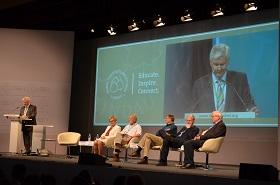Using AI to control energy for indoor agriculture
30 September 2024
Published online 15 July 2013

Only two Arab researchers attended this year's Lindau Laureate Meeting – representing a missed opportunity for many scientists from the MENA region to communicate and connect with international peers.
The two researchers, both from Egypt, joined 625 undergraduate and postgraduate students from around the world, while developing countries such as China, India and Pakistan saw numbers of representatives increase at the meeting, held in the German city this month.
In 2011 there were 12 Arab participants and critics say the decrease is indicative of a weakening cohesion between players in Arab research sectors.
Mahmoud El-Sabahy, director of the Assiut International Center of Nanomedicine, Egypt, one of the two Arabs who attended, said: "We lack the system that connects policymakers, professors and young researchers".
El-Sabahy suggests the main problem is a lack of communication between researchers which means the importance of the conference – a forum for emerging scientists to listen to and rub shoulders with 34 Nobel laureates – is not conveyed to young researchers.
A conference insider agrees. Wolfgang Schürer, the chairman of the Foundation Lindau Nobel prizewinners Meetings and vice-president of the Council for Lindau Nobel Laureate Meetings, said: "Unfortunately some professors in the MENA region seem to be too busy to invest time to nominate and select young researchers to come to the Lindau meetings."
"It also appears that the connection between the ministries of science, universities and young researchers in the MENA region is not as effective as it should be."
Schürer also suggested that current regional unrest is hindering opportunities for collaborative work.
Some professors in the MENA region seem to be too busy to invest time to nominate and select young researchers.
The other Arab representative at Lindau, Marwa Ragab, an analytical chemist at the Faculty of Pharmacy, Alexandria University, says her nomination to attend came through the administration office at her university.
"There was no selection procedure. I only had to fill some documents to prove I am eligible to attend," she says.
Marwa says that many of her colleagues were not interested because the meeting is not considered a helpful conference for improving chances of promotion.
Schürer says the Lindau Council has recently invited ministers of scientific research from Egypt and Algeria, but they did not come. Invitations to professors from the King Abdullah University of Science and Technology (KAUST) in Saudi Arabia were also refused.
Several organizations offer funding for researchers to attend the meeting, but Arabs rarely apply, which means they usually go to other countries.
Schürer is hopeful that stories produced by Nature from Lindau would spur regional interest in the conferences. The organizers are also approaching partners, such as the Bibliotheca Alexandrina in Egypt and the Abu Dhabi Science Festival, to translate content from the meetings into Arabic to increase their regional reach.
doi:10.1038/nmiddleeast.2013.102
Stay connected: